Gazette 34 - November 2016
Contents
Focus on
Latest ECML resources
Current ECML programme developments 2016-2019
National developments in France and Switzerland
Council of Europe developments
Language news from other organisations: European Commission (Eurydice, EPALE), OECD, International Organization of la Francophonie
Quick links
Focus on ...
Livestream on Wednesday 7 December, from 09.30-17:45 – Colloquium: Ensuring quality in language testing and assessment: the contribution of the Common European Framework of Reference (CEFR)

- How do I know whether a test is at the CEFR level it claims to be at?
- Can an exam that tests linguistic competence (language use) be linked to the CEFR?
- How do we make sure that our pass/fail decisions are related to the CEFR?
- Can we test at more than one CEFR level in one test?
- Can we link our tests to the CEFR levels even though we do not have statistics on student performance on our tests, apart from total scores?
- Can tests of different skills be summarized at one CEFR level?
The European Centre for Modern Languages, in cooperation with the European Commission, will bring together prominent specialists in the area of language testing and assessment to debate these issues on 7 December 2016.
For further information on the event, including the programme, please visit the colloquium webpage.
WEBCAST – starting on Wednesday, 7 December at 09:30 Central European Time.
Cooperation between the ECML and the European Commission
Relating language curricula, tests and examinations to the Common European Framework of Reference (RELANG)
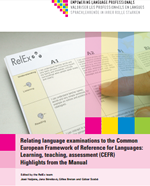 Within the framework of the ECML-European Commission cooperation agreement on Innovative methodologies and assessment in language learning, nine national workshops took place on the initiative "Relating language curricula, tests and examinations to the Common European Framework of Reference (RELANG)" between January and September 2016: Zagreb (Croatia), Tartu (Estonia), Reykjavik (Iceland), Rome (Italy), Riga (Latvia), Valletta (Malta), Lisbon (Portugal), Sinaia (Romania).
Within the framework of the ECML-European Commission cooperation agreement on Innovative methodologies and assessment in language learning, nine national workshops took place on the initiative "Relating language curricula, tests and examinations to the Common European Framework of Reference (RELANG)" between January and September 2016: Zagreb (Croatia), Tartu (Estonia), Reykjavik (Iceland), Rome (Italy), Riga (Latvia), Valletta (Malta), Lisbon (Portugal), Sinaia (Romania).
With the renewal of the cooperation agreement for 2017, a new round of workshops will take place in the following countries over the coming months: Armenia, Belgium, Greece, Ireland, Latvia, Lithuania, Malta, Portugal, Spain.
More information on the initiative and the events taking place is featured on the RELANG website
Supporting multilingual classrooms
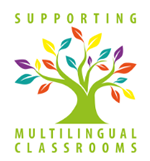 This initiative provides training workshops to help member states ensure access to quality education for migrant learners. The workshops seek to assist teachers, teacher educators, administrators and school leaders in bridging the attainment gap between these learners and non-migrant pupils.
This initiative provides training workshops to help member states ensure access to quality education for migrant learners. The workshops seek to assist teachers, teacher educators, administrators and school leaders in bridging the attainment gap between these learners and non-migrant pupils.
The national workshops which draw on a wide range of successful ECML projects and resources in this area address, in particular, the following issues:
- whole-school policies and strategies to support the integration of migrant learners;
- holistic approaches to language learning and teaching including the language of schooling, foreign languages and home languages;
- challenges facing non-language teachers and how to adapt pedagogical approaches to meet the needs of migrant learners.
Between April and September 2016, seven events took place on the initiative "Supporting multilingual classrooms" in Ghent (Belgium), Prague (Czech Republic), Helsinki (Finland), Ioannina (Greece), Dublin (Ireland), Reykjavik (Iceland) and Warsaw (Poland).
A further series of nine workshops are foreseen in the course of 2017 in Austria, Belgium, Czech Republic, Estonia, Finland, Greece, Latvia, Malta, Slovenia.
More information on this activity is featured on the dedicated website.
Latest ECML resources
PluriMobil – Plurilingual and intercultural learning through mobility – Practical resources for teachers and teacher trainers
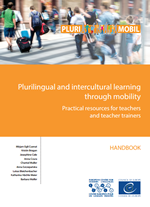 PluriMobil is a teaching tool that offers activities and materials to support the plurilingual and intercultural learning of students for the phases before, during and after a mobility activity. This tool can be adapted to mobility projects across all educational levels.
PluriMobil is a teaching tool that offers activities and materials to support the plurilingual and intercultural learning of students for the phases before, during and after a mobility activity. This tool can be adapted to mobility projects across all educational levels.
Target users: teachers and teacher trainers, international officers and other stakeholders.
Authors: Mirjam Egli Cuenat, Kristin Brogan, Anna Czura, Chantal Muller, Josephine Cole, Anna Szczepańska, Lukas Bleichenbacher, Katharina Höchle Meier, Barbara Wolfer.
Languages: English – French.
MALEDIVE – Teaching the language of schooling in the context of diversity – Study materials for teacher development
 The study materials focus on teacher education for the language of schooling (e.g. French in France, Polish in Poland). They draw on the linguistic and cultural diversity in the classroom for the benefit of all learners.
The study materials focus on teacher education for the language of schooling (e.g. French in France, Polish in Poland). They draw on the linguistic and cultural diversity in the classroom for the benefit of all learners.
The MALEDIVE website contains study materials for pre- and in-service teacher education, ideas for the promotion of teacher collaboration across school subjects, learner profiles helping teachers to prepare for heterogeneity in the classroom, as well as activities to develop plurilingual approaches.
Target users: teachers of the languages of schooling, teacher educators, curriculum developers.
Authors: Eija Aalto, Andrea Abel, Nathalie Auger, Dagmar Gilly, Katja Schnitzer.
Auli Kotimäki and Joël Thibeault (associate partners).
Languages: English – French – German.
Training and consultancy services
 The ECML offers its member states European expertise in language education adapted to the concrete needs and specific contexts within individual countries. This bilateral support in a range of key areas helps strengthen the cooperation between member states and the ECML by taking the expertise gained from ECML projects directly into member states. The revised flyer provides details of all activities on offer to member states.
The ECML offers its member states European expertise in language education adapted to the concrete needs and specific contexts within individual countries. This bilateral support in a range of key areas helps strengthen the cooperation between member states and the ECML by taking the expertise gained from ECML projects directly into member states. The revised flyer provides details of all activities on offer to member states.
Revised flyer (November 2016): English – French
Website: English – French
Current ECML programme developments 2016-2019
Action research communities for language teachers
 Central workshop (Graz, 10-11 November 2016)
Central workshop (Graz, 10-11 November 2016)
The ECML workshop provided an excellent opportunity for 39 experts to exchange ideas on action research and to bring together action research initiatives as practised across 32 European countries. The event sought to provide incentives to continue with action research and to discover new paths together, as well as generating mini-action research projects to be carried out over the next few months with the support of international colleagues.
News item: English – French
Workshop for teachers of German "Teaching about the culture of a target-country language in the language classroom: Austria" (Hermannstadt/Sibiu, Romania, 20-22 October 2016)
During the workshop teachers were introduced to an action research way of thinking and the benefits of action research for the enhancement of their classroom practice. The activities enabled to exchange and compare knowledge, beliefs and opinions about Austria, to look at teaching materials on Austria and approaches that teachers might use, and to generate shared visions for lessons on aspects of culture. The workshop also provided general information about the project "Action Research Communities for language teachers" and the offer of the European Centre for Modern Languages (ECML) for teachers of languages in this respect.
News item (see under Project news): English – German
LangOER Conference "Open Education: promoting diversity for European Languages" (Brussels, Belgium, 26-27 September 2016): ECML expert mission
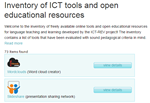 The conference was organised by LangOER and the Educational Repositories Network (EdReNe). On this occasion, very interesting presentations were offered by a wide range of speakers. On behalf of the ECML, Pauline Ernest, lecturer in English and coordinator of English courses at the Centre d'Idiomes Moderns, Universitat Oberta de Catalunya, gave a presentation on the ICT-REV project. She described in particular the ICT-REV inventory, developed jointly by the ECML and the European Commission, which provides rapid, easy access to information on approximately 80 ICT tools and open educational resources, with practical examples of usage, selected and evaluated by language professionals from former ECML workshops.
The conference was organised by LangOER and the Educational Repositories Network (EdReNe). On this occasion, very interesting presentations were offered by a wide range of speakers. On behalf of the ECML, Pauline Ernest, lecturer in English and coordinator of English courses at the Centre d'Idiomes Moderns, Universitat Oberta de Catalunya, gave a presentation on the ICT-REV project. She described in particular the ICT-REV inventory, developed jointly by the ECML and the European Commission, which provides rapid, easy access to information on approximately 80 ICT tools and open educational resources, with practical examples of usage, selected and evaluated by language professionals from former ECML workshops.
Users of the inventory are encouraged to evaluate the tools, and suggest new ones, thus developing an ever-growing resource of great practical use for language professionals.
News item (see under Latest articles): English – French
Intercultural and plurilingual approaches to teaching – FREPA tools: analysis and further development in the Slovenian context (Ljubljana, Slovenia, 7-8 November 2016): report of the National Education Institute of Slovenia
 The event focused on the relevance of the Framework of reference for pluralistic approaches (FREPA) for the Slovenian foreign language teaching context and on two pluralistic approaches – the intercultural and integrated didactic –, which were illustrated through practical examples of teaching material. The FREPA descriptors as translated into Slovene were used to check the FREPA database material criteria.
The event focused on the relevance of the Framework of reference for pluralistic approaches (FREPA) for the Slovenian foreign language teaching context and on two pluralistic approaches – the intercultural and integrated didactic –, which were illustrated through practical examples of teaching material. The FREPA descriptors as translated into Slovene were used to check the FREPA database material criteria.
It was concluded that these descriptors are an appropriate foundation for the systematic planning and implementing of pluralistic approaches in teaching. It was decided to design teaching materials according to given criteria and add them in the FREPA database, to create a school partnership network for pluralistic approaches, and to update the country web page on the CARAP website dedicated to Slovenia with the events and materials since 2014.
Read the full news item (see under "Latest articles"): English – French
Forthcoming ECML events
 Annual meeting of the ECML’s Professional Network Forum (8-9 December 2016)
Annual meeting of the ECML’s Professional Network Forum (8-9 December 2016)
More information about this network
Programme related events
Training and consultancy activities for member states
National developments
France
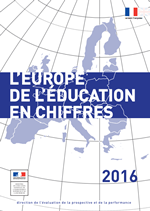 Student mobility: The 2017 campaign, consisting of programmes which allow students and apprentices to participate in exchanges in Europe and worldwide, has been launched. The National education official newsletter (Bulletin officiel) of 16 June, 2016, has published two circulars on student mobility. The first circular concerns the Franco-German mobility programme for students and apprentices. The second circular on mobility in Europe and around the world targets high-school and college students.
Student mobility: The 2017 campaign, consisting of programmes which allow students and apprentices to participate in exchanges in Europe and worldwide, has been launched. The National education official newsletter (Bulletin officiel) of 16 June, 2016, has published two circulars on student mobility. The first circular concerns the Franco-German mobility programme for students and apprentices. The second circular on mobility in Europe and around the world targets high-school and college students.
CIEP's documentary monitoring: latest releases in language education (November issue 2016).
Statistical directory: "L'Europe de l'éducation en chiffres" published by the Department of Studies of the French Ministry of National Education.
(All resources available in French)
Switzerland
 Institut de recherche et de documentation pédagogique (IRDP): latest publications – documentary monitoring
Institut de recherche et de documentation pédagogique (IRDP): latest publications – documentary monitoring
Council of Europe developments
Language policy
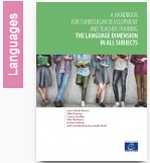 Just published (November 2016)
Just published (November 2016)
- The language dimension in all subjects ‐ A handbook for curriculum development and teacher training
- Les dimensions linguistiques de toutes les matières scolaires ‐ Guide pour l'élaboration des curriculums et pour la formation des enseignants
By Jean-Claude Beacco, Mike Fleming, Francis Goullier, Eike Thürmann, Helmut Vollmer, with contributions by Joseph Sheils
Framework Convention for the protection of national minorities: latest developments in Albania, Estonia, Kosovo* and Ukraine
 Latest news: English – French
Latest news: English – French
* All reference to Kosovo, whether to the territory, institutions or population, shall be understood in full compliance with United Nations Security Council Resolution 1244 and without prejudice to the status of Kosovo.
Pestalozzi programme for the professional development of teachers and education actors
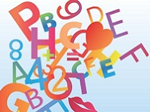 Report of the European Workshop "Towards an inclusive school: addressing respect and celebrating diversity" (Santander, Spain, 16-19 April 2016)
Report of the European Workshop "Towards an inclusive school: addressing respect and celebrating diversity" (Santander, Spain, 16-19 April 2016)
Report of the 3rd National Dissemination Event on the values, principles and practices of the Pestalozzi Programme of the Council of Europe
(Thessaloniki, Greece, 22 October 2016)
Council of Europe’s Democracy Innovation Award
 The Award goes to Kiron Open Higher Education GmbH, a German initiative in favour of higher education for refugees.
The Award goes to Kiron Open Higher Education GmbH, a German initiative in favour of higher education for refugees.
Council of Europe: Newsroom – Press release
Photo: Florian Rampelt, Head of Product, Kiron Open Higher Education GmbH. @ Council of Europe.